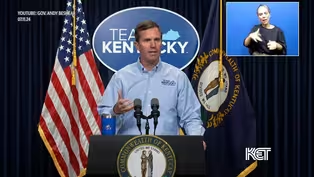
Olympic Training
Clip: Season 3 Episode 47 | 2m 42sVideo has Closed Captions
How Olympic athletes train mind and body to compete.
We sat down with University of Kentucky Assistant Professor Lauren Erickson to talk about how Olympic athletes train while they are at the games and how they handle the pressure of representing their countries on an international stage.
Problems playing video? | Closed Captioning Feedback
Problems playing video? | Closed Captioning Feedback
Kentucky Edition is a local public television program presented by KET

Olympic Training
Clip: Season 3 Episode 47 | 2m 42sVideo has Closed Captions
We sat down with University of Kentucky Assistant Professor Lauren Erickson to talk about how Olympic athletes train while they are at the games and how they handle the pressure of representing their countries on an international stage.
Problems playing video? | Closed Captioning Feedback
How to Watch Kentucky Edition
Kentucky Edition is available to stream on pbs.org and the free PBS App, available on iPhone, Apple TV, Android TV, Android smartphones, Amazon Fire TV, Amazon Fire Tablet, Roku, Samsung Smart TV, and Vizio.
Providing Support for PBS.org
Learn Moreabout PBS online sponsorship>> It takes years of training to get to the Olympics.
But you have to KET trying once you get there, we sat down with the University of Kentucky assistant professor Lauren Erickson to talk about how Olympic athletes train while they're at the games, how they handle the pressure of representing their countries on an international stage >> there's a lot that goes into being a wimp and kind of as you look at these athletes that are performing right now, this is taking years and years actually get to the level that we're at a lot of hours dedicated to their sport and doing all the things behind the scenes and probably a lot of sacrifice to.
I think that gets underappreciated is when you get to this level, how much you're actually having to put into your support and dedication to that.
So a lot of time, a lot of effort, a lot of dedication and just hours and hours of training to get to the Olympics.
All of these athletes have to get through some sort of qualification rounds, even get to this level.
So they've been kind of cycling through how this could have been a four-year cycle for a lot of athletes could be a one-year cycle for a lot of athletes.
>> But they are trying to build to get to this peak performance level at the Olympics.
And so most people think, oh, from a trading perspective is how do you actually balance that out?
But really, I think a lot of these athletes are working on so much more behind the scenes.
The topic that comes up a lot to like if you're performing at this level, what do you actually consuming?
And I think for every individual is actually going to be quite different.
I think everyone has to learn what's going to work best for their body, especially on race day.
I work with a lot of runners and you kind of have to know what's going to work well, and that pre-race meal.
But I think what is important to note is that all these athletes have to be consuming enough.
You're out there exerting yourself for hours, at least with these So it's always making sure that whatever it is, it's just that it's a volume that's enough to handle the activities that you're doing.
It's not so much maybe what they're doing from a training standpoint, but it's how are they actually recovering throughout all this time?
So are they getting enough sleep?
Are they getting enough intake from their diet?
Are they managing their stress?
I think when you look at people in their own TV, the amount of actual stress that can come from being an Olympic athlete.
So it's kind of bounce everything all at once.
Huge credit to all those athletes for even being able to speak out about this is something that probably every athlete is having to deal with.
When you're on camera all the time.
It can also be kind of a higher stress.
Well, but I don't think people realize the amount of pressure and the amount of stress that goes into being representing your own team in your own country.
And so all of a sudden you have this one moment to perform.
Even they've been training for years to be able to do that.
So a lot of these people probably have people in the real house.
You know, you think of the physical side, you've got your Andy's got your 80's.
You got up to use of a whole host of people that's making up your team.
>> The same thing is going to need to go into the mental aspect side, whether it's a therapist or other people in your wheelhouse or social support networks.
It is huge because the volume of depression stress that they're under this can be quite a lot.
>> The University of Kentucky
Gov. Andy Beshear Passed Over as Vice Presidential Nominee
Video has Closed Captions
Clip: S3 Ep47 | 1m 25s | Gov. Andy Beshear reacts to Vice President Kamala Harris’ pick for running mate. (1m 25s)
Headlines Around Kentucky (8/6/2024)
Video has Closed Captions
Clip: S3 Ep47 | 3m 14s | A look at stories making headlines around the state. (3m 14s)
Jefferson County Prepares for New School Year
Video has Closed Captions
Clip: S3 Ep47 | 2m 35s | JCPS leaders give update on transportation. (2m 35s)
National Conference of State Legislatures Begins
Video has Closed Captions
Clip: S3 Ep47 | 3m 5s | Ever-changing workforce a topic of discussion at NCSL in Louisville this week. (3m 5s)
Preventing Infections at School
Video has Closed Captions
Clip: S3 Ep47 | 3m 9s | Heading back to school means more risk for infections. (3m 9s)
Providing Support for PBS.org
Learn Moreabout PBS online sponsorship
- News and Public Affairs

Top journalists deliver compelling original analysis of the hour's headlines.

- News and Public Affairs

FRONTLINE is investigative journalism that questions, explains and changes our world.












Support for PBS provided by:
Kentucky Edition is a local public television program presented by KET




